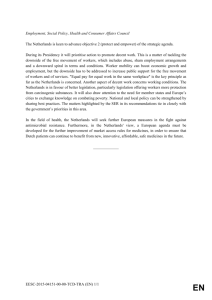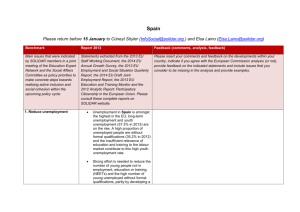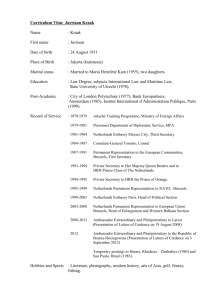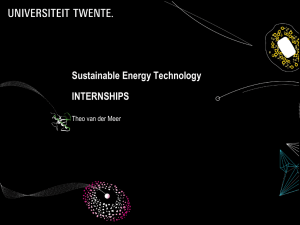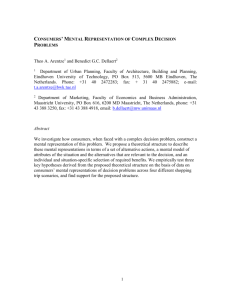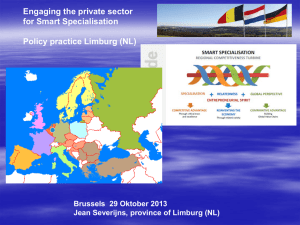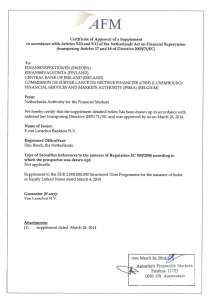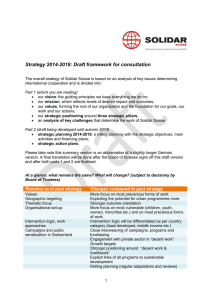Monitoring template
advertisement
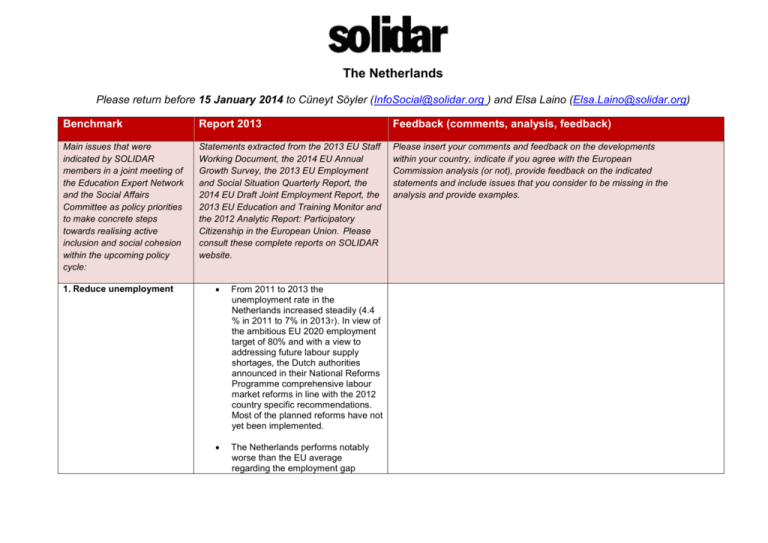
The Netherlands Please return before 15 January 2014 to Cüneyt Söyler (InfoSocial@solidar.org ) and Elsa Laino (Elsa.Laino@solidar.org) Benchmark Report 2013 Feedback (comments, analysis, feedback) Main issues that were indicated by SOLIDAR members in a joint meeting of the Education Expert Network and the Social Affairs Committee as policy priorities to make concrete steps towards realising active inclusion and social cohesion within the upcoming policy cycle: Statements extracted from the 2013 EU Staff Working Document, the 2014 EU Annual Growth Survey, the 2013 EU Employment and Social Situation Quarterly Report, the 2014 EU Draft Joint Employment Report, the 2013 EU Education and Training Monitor and the 2012 Analytic Report: Participatory Citizenship in the European Union. Please consult these complete reports on SOLIDAR website. Please insert your comments and feedback on the developments within your country, indicate if you agree with the European Commission analysis (or not), provide feedback on the indicated statements and include issues that you consider to be missing in the analysis and provide examples. 1. Reduce unemployment From 2011 to 2013 the unemployment rate in the Netherlands increased steadily (4.4 % in 2011 to 7% in 20137). In view of the ambitious EU 2020 employment target of 80% and with a view to addressing future labour supply shortages, the Dutch authorities announced in their National Reforms Programme comprehensive labour market reforms in line with the 2012 country specific recommendations. Most of the planned reforms have not yet been implemented. The Netherlands performs notably worse than the EU average regarding the employment gap between people with a migrant background and nationals. 2. Improve access to and quality of healthcare and social services 1 Youth unemployment has been increasing at an accelerated pace in recent months to 9.8% in 2012Q41). If the large increase in youth unemployment could be stopped, this could potentially help prevent labour supply shortages in the future and prevent a loss of human capital and valuable skills. There is a risk in the Netherlands that the high quality standards of public service provision will not be maintained and it could lead to an increase in expenditure on temporary workers. As part of a net expenditure savings effort, the government is also planning to decentralise a large number of competences to municipalities, ranging from youth services to long-term health care. Whether these efficiency gains can be fully realised is very questionable, especially within the timeframes envisaged. Eurostat, Youth Unemploymnet. Available at: http://epp.eurostat.ec.europa.eu/statistics_explained/index.php?title=File:Youth_unemployment,_2012Q4_%28%25%29.png&filetimestamp=20130418091546 3. Promote access and participation in lifelong learning 4. Strengthen active citizenship and volunteering for social cohesion In the Netherlands adult participation in lifelong learning (LLL) reached 16.7% in 2012, surpassing the 15% benchmark set out in Europe 2020. While a number of initiatives have been undertaken to encourage training, a formal comprehensive framework for LLL allowing for the possibility to use funds for LLL for both intra- and inter-sectoral schooling could further increase the efficiency of the system. ‘Conventional’ political participation: This dimension concerns the promotion of involvement in what is traditionally considered as ‘politics’, voting in elections, political education and membership of political parties. Of the countries that stated a degree of policy emphasis of this dimension: eight countries have it as having some emphasis including the Netherlands. Community activities: This dimension of Participatory Citizenship is concerned with the promotion of volunteering and/or voluntary organisations, the offering of welfare and support, and the provision of cultural activities. Of the countries that stated a degree of policy emphasis of this dimension, 9 countries give it some emphasis including the Netherlands. Political civil society activities: Of those European countries that provided an assessment of the degree of policy emphasis of this dimension: one country said it was a major policy emphasis (Greece); 11 countries assessed it as having some policy emphasis including the Netherlands. Values of democracy: This dimension is concerned with the support and promotion of values, such as human rights, social cohesion, respect, intercultural learning, equality and tolerance. Not all European countries expressed the degree of emphasis given to this dimension in policy. However, of those countries that did, 9 countries said that there was some policy emphasis including the Netherlands. There has been a decline in voting in national elections in the Netherlands. Nordic countries and the Netherlands are most active in volunteering in environmental organisations with about 5%–15% of adults engaged . Regarding tolerance towards migrants, it is the Nordic countries and the Netherlands that have the highest rates of tolerance towards migrants with about 60% of adult in these countries indicating tolerance towards migrant groups and employment. 5. Fight discrimination and social exclusion Although the Netherlands has traditionally performed well on social inclusion, some worrying trends are rising. The number of people in lowworkintensity households has increased by 75,000 since 2008, while the Europe 2020 target for reducing the number of people living in a low-work intensity household was set at 93,000. Rising unemployment rates could heighten the risk of poverty as more people become dependent on benefits. This increase in poverty particularly affects single parents, single people, those with a migrant background, the self-employed, and households living on benefits other than pensions. Please add feedback on issues not indicated in the above mentioned bench marks 6. Promote the social economy General remarks and other comments Contact details: Organisation: Please indicate the name of your organisation Name: Please include your name; SOLIDAR will not publish personal data Date, Place: Please include the date and place of filling out this form Mail: Please include your e-mail; SOLIDAR will not publish personal data Telephone: Please include your telephone number; SOLIDAR will not publish personal data Description: Please include a short description of your organisation, maximum 500 words
